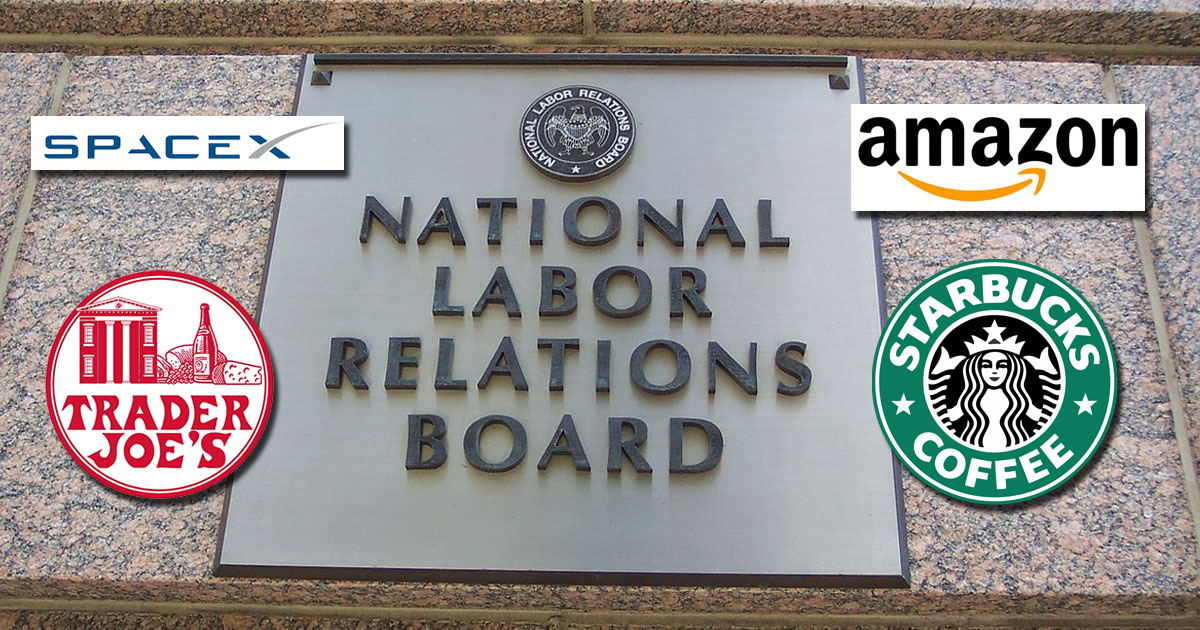NATIONAL
What’s behind the corporate effort to kneecap the NLRB?
SpaceX, Amazon, Trader Joe’s, and Starbucks are trying to have the NLRB declared unconstitutional—after collectively being charged with hundreds of violations of workers’ organizing rights
The following is from the Economic Policy Institute:
WASHINGTON, D.C. (March 11, 2024) — Workers want unions now more than they have in a generation. Evidence suggests more than 60 million non-union workers would like a union at their workplace. The National Labor Relations Board (NLRB)—the agency established by Congress in 1935 to protect workers’ organizing rights—is handling more union representation elections and unfair labor practice charges than they have in years.
So how have companies responded to this surge in worker organizing?
Some have honored their workers’ choice and tried to start a positive labor-management relationship, as Microsoft, New Flyer, Ben & Jerry’s, and other companies have done. These companies see the value of a constructive relationship with their employees to their bottom line.

Others have taken the opposite tack—to the extreme. Led by Elon Musk’s SpaceX, and joined by Amazon, Trader Joe’s, and Starbucks, these companies are engaged in a legal battle trying to have the NLRB declared unconstitutional, by resurfacing long-rejected constitutional arguments about the agency’s structure. If they succeed, it would kneecap the agency and its operations at the very time workers need it the most.
Why are these companies taking this scorched-earth approach? What is motivating these attacks?
In the last two years, workers at all of these companies have exercised their rights under our labor law to come together and act collectively to improve conditions at their workplace. The law protects this collective action regardless of whether workers are trying to form a union.
Baristas at nearly 400 Starbucks locations have voted to form a union. Amazon warehouse workers in Staten Island voted to unionize two years ago this month. Workers at several Trader Joe’s locations have unionized in the last two years. None of these workers has a collective bargaining agreement yet, because Amazon, Trader Joe’s, and Starbucks have stalled the bargaining process—an all-too-typical move by corporations when workers first organize. (The recent announcement by Starbucks Workers United and Starbucks committing themselves to negotiate a foundational framework for bargaining gives reason for hope that a first-contract breakthrough at that company is near.)
Collectively, these companies have been charged with hundreds of violations of workers’ organizing rights, according to NLRB data obtained through an EPI public record request. Together, the companies have been charged with firing pro-union workers, retaliating against organizing by cutting hours, closing shops, denying benefits being provided to non-union workers, and bargaining in bad faith. The NLRB has sought, and won, several injunctions in federal court, where judges have ordered the companies to rehire workers who they illegally fired, and otherwise comply with the law.
According to the NLRB, there are currently more than 250 open or settled cases against Amazon for violating workers’ organizing rights. Three administrative law judges have already ruled against Amazon, and a federal court has ordered Amazon to not interfere with workers’ organizing rights.
There are 741 open or settled cases against Starbucks. The NLRB has won two court injunctions ordering Starbucks to re-hire baristas they illegally fired for organizing. In all, Starbucks has been ordered to reinstate 59 baristas who were illegally fired. To date, NLRB administrative law judges have issued 48 decisions finding that Starbucks has broken the law.
Trader Joe’s also has been charged with retaliating against workers for organizing activity, and for failing to bargain in good faith.
While most of these charges concern illegal interference with workers seeking to form a union, the charges against SpaceX involve workers coming together to address workplace issues through what is known as “protected concerted activity.” Eight SpaceX employees joined together and wrote an open letter raising workplace concerns, including concerns about comments by Elon Musk on workplace issues. In retaliation, they were fired. The NLRB brought a complaint against Elon Musk and SpaceX, alleging that the company had illegally interfered with the workers’ right to engage in collective action.
Rather than challenging the complaint through the usual processes, SpaceX sued the NLRB in federal court in Texas, claiming the agency’s structure is unconstitutional. Ironically, two of SpaceX’s lawyers—Harry Johnson and John Ring—are former Republican appointees to the NLRB, the very agency they are now arguing is unconstitutional. Amazon, Trader Joe’s, and Starbucks have raised the same arguments in legal proceedings against their companies. Whether Starbucks continues this challenge in light of the recent agreement with Starbucks Workers United has not yet been reported.
By any measure, these long-rejected legal arguments should fail. But in the meantime, an already underfunded agency has to spend scarce resources to defend itself from these attacks, diverting resources away from protecting workers’ organizing rights at a time when those rights need protecting more than ever, given the surge in worker organizing. And, furthermore, the companies have shifted some of the media’s focus away from their lawbreaking to esoteric legal arguments about the agency that is prosecuting them for blocking their workers’ ability to organize and win a collective bargaining agreement with their employer.





